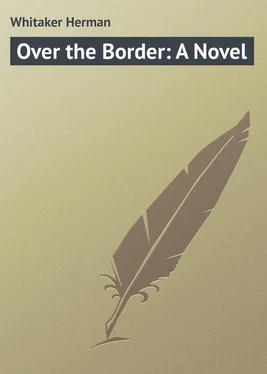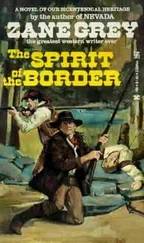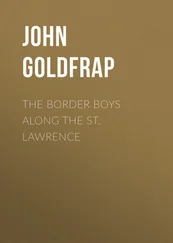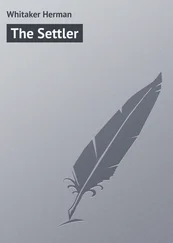Herman Whitaker - Over the Border - A Novel
Здесь есть возможность читать онлайн «Herman Whitaker - Over the Border - A Novel» — ознакомительный отрывок электронной книги совершенно бесплатно, а после прочтения отрывка купить полную версию. В некоторых случаях можно слушать аудио, скачать через торрент в формате fb2 и присутствует краткое содержание. Жанр: foreign_prose, foreign_adventure, на английском языке. Описание произведения, (предисловие) а так же отзывы посетителей доступны на портале библиотеки ЛибКат.
- Название:Over the Border: A Novel
- Автор:
- Жанр:
- Год:неизвестен
- ISBN:нет данных
- Рейтинг книги:3 / 5. Голосов: 1
-
Избранное:Добавить в избранное
- Отзывы:
-
Ваша оценка:
- 60
- 1
- 2
- 3
- 4
- 5
Over the Border: A Novel: краткое содержание, описание и аннотация
Предлагаем к чтению аннотацию, описание, краткое содержание или предисловие (зависит от того, что написал сам автор книги «Over the Border: A Novel»). Если вы не нашли необходимую информацию о книге — напишите в комментариях, мы постараемся отыскать её.
Over the Border: A Novel — читать онлайн ознакомительный отрывок
Ниже представлен текст книги, разбитый по страницам. Система сохранения места последней прочитанной страницы, позволяет с удобством читать онлайн бесплатно книгу «Over the Border: A Novel», без необходимости каждый раз заново искать на чём Вы остановились. Поставьте закладку, и сможете в любой момент перейти на страницу, на которой закончили чтение.
Интервал:
Закладка:
“All we’ve gotter do now,” Sliver chuckled as they rode on down the street, “is to rope a stray calf or a pig on the way home, an’ Rosa’ll be fixed for a month.”
But, alas for Rosa! After they had stabled their horses and eaten, followed one of those debauches that occur when men with natural “thirsts” turn loose after a period of deprivation. During its course they spent first the thirty-two pesos and some centavos , drank up their own tequila , finally bartered the groceries to buy still more liquor for the rabble of peones and brown girls that flocked to the cantina like buzzards to carrion.
The “drunk” went through the customary stages from boisterous conviviality, singing, loud boasting, quarreling, fighting. Three times Sliver and Jake locked and rolled on the floor, tearing like tigers at each other’s throats, nor let go till pried apart by Bull. Worse, because really terrible, was it to see the giant rustler, after the other two had lapsed into sottish sleep, sitting with his broad shoulders against the adobe wall, huge hands squeezing an imaginary throat, while his drink-crazed brain rehearsed the details of some past tragedy. Shortly thereafter he also rolled over in drunken sleep.
As they lay there, crumpled, limp, breathing stertorously, there was nothing edifying in the spectacle. It would be unfair to hint at a likeness between them and the swine that snored in the kennel outside; unfair to the swine, which never descend through drink from their natural estate. Drunkards and outlaws, they were probably as low, at that moment, as human beings ever go. Yet when they awoke, sans groceries, sans tequila , sans money, but plus three splitting headaches, they faced the situation with saving humor.
“Tough on Rosa,” Jake said, with a rueful grin.
“If she’s still there,” Sliver doubted. “An’ I’ll bet a peppercorn to a toothpick she ain’t.”
“Chihuahua, now, or starve,” Bull succinctly summed the situation. He added, grinning, “Anyway, we’ll travel light.”
IV: THE TRAIL OF THE COLORADOS
Five days later the Three looked down from a mountain shoulder upon the first and greatest of the Chihuahua haciendas .
Far beyond the limit of sight its level ranges ran. From the crest of the blue range in the distance, their glances would still have traveled on less than half-way to the eastern limit. The Mexican Central train, then running southward in the trough between two ranges thirty miles away, had been speeding all day across lands whose ownership was vested in one man. The half-score of towns, hundred villages, in its environs were there only by his consent. Until the bursting of the first revolution had sent him flying into El Paso with other northern overlords, their thousands of inhabitants, shopkeepers, muleteers, artisans, peones , drew by his grace the very breath of life.
“Seems foolish even to think that one could own all that.”
Jake’s glance wandered over the desert that laid off its shining distances to the horizon. Here and there flat-topped mesas uplifted their chrome and vermilion façades from the dead flat. Very far away, one huge fellow raised phantom battlements from the ghostly waters of a mirage. It was altogether unlike their own Sonora desert. In place of the familiar seas of sage, cactus and spiky yucca were thinly strewn over a land whose unmitigated drought was accentuated by the parched windings of waterless streams. Gold! gold! its shimmer was everywhere; burned in the sand; in the dust whorls that danced with the little winds; in the air that flowed like wine around the royal purple of distant ranges. Lifeless, without sign of human tenancy, its solitary reaches were infinite as the ocean. Yet man and his works were not so very far away. Certain black specks that hovered or wheeled against the blue of the sky a mile away served as a sign-post.
“Vultures,” Sliver pointed. “Must be something dead over there.”
“Or dying?” Bull questioned. “Otherwise the birds ’u’d settle. These days it’s as likely to be human as horse. We might ride down that way.”
And human it proved to be when, half an hour later, they rode out of encircling cactus into an open space around a giant sahuaro . Head fallen back so that his face was turned up to the torrid sun; relaxed, limp as a rag, a man hung by his wrists that had been tied at the full stretch of his arms around the sahuaro’s barrel. During the sixty hours he had hung there without food or water the skin had shrunk till it lay like scorched parchment on the bones of his face. In addition to the vultures that hovered above, others hopped or fluttered over the hot sands, or perched, patient as death itself, on the surrounding cactus. Now and then a bolder scavenger hopped upon his shoulder. But a slow roll of the head, sudden hiss of dry breath, would drive it away. At the approach of the Three the evil creatures rose in a black cloud, filling the air with the beat and swish of coffin wings.
“He’s white! a gringo!” Bull cried it while he hacked at the cords.
“The poor devil!” Sliver spoke softly as he lifted and laid the poor, limp body on his outspread coat.
While he laved the shrunken face and Bull poured water, drop by drop, on the man’s swollen tongue, Jake carefully parted the swollen flesh of the wrists and cut away the cords.
If old man Livingstone, or other of the border ranchers who had suffered through their raids, could have seen them at their merciful work, have noted their gentleness, heard their sympathetic comment, they would probably have refused the evidence of their own eyes. Though still too weak to even raise his head, they brought the man in an hour to the point where he was able, in whispers, to give an account of himself.
He was a miner and his claim lay on a natural bench that jutted out from the sheer wall of a great gulch in the mountains about a mile away. His house, a hut of corrugated iron, stood with a few rough work buildings up there. If he could only get to it, he’d be all right.
And he soon did. Lifted by the others to the saddle in front of Bull and cradled like a child in the rustler’s great arms, he scarcely felt the journey. Viewed as he hung on the sahuaro , dirty, bruised, shrunken by fever and thirst, he might have been any age. But when laid on his bed, washed, fed with a quick soup compounded by Sliver out of pounded jerky and some pea meal he found on a shelf, he proved to be a typical American miner of middle age – short gray beard, hawk profile, high cheek-bones, eyes blue and hard as agate. By the time they had cooked for themselves – for even if his condition had permitted, it was now too late to go on – he had recovered his voice and told them all.
“It was the ‘Colorados’ that tied me up. I knew them by the ‘red hearts’ on the breasts of their charro jackets.”
Even up into their far corner of Sonora had penetrated something of the terror associated with the name. Originally the “Colorados” had been Orozco’s soldiers. But when dispersed by the collapse of his revolution against Madero they had split up into bands and overrun the northern Mexican states. Because of their frightful cruelties they were shot by the Carranzistas whenever caught. But though the spread of the latter power was driving them farther south, they still made occasional raids.
“But I was lucky to get off with that,” he said, after describing the beating that had preceded the tying-up. “They cut the soles off the feet of two of my peones , then drove them, stark-naked, through spiky chollas. When the poor devils fell, exhausted, they beat them to death where they lay on the ground. Surely I was lucky, for if it hadn’t been that they thought I had money, and tied me up to make me confess, I’d have got the same. They left me to raid some rancho , but swore they’d come back.”
Читать дальшеИнтервал:
Закладка:
Похожие книги на «Over the Border: A Novel»
Представляем Вашему вниманию похожие книги на «Over the Border: A Novel» списком для выбора. Мы отобрали схожую по названию и смыслу литературу в надежде предоставить читателям больше вариантов отыскать новые, интересные, ещё непрочитанные произведения.
Обсуждение, отзывы о книге «Over the Border: A Novel» и просто собственные мнения читателей. Оставьте ваши комментарии, напишите, что Вы думаете о произведении, его смысле или главных героях. Укажите что конкретно понравилось, а что нет, и почему Вы так считаете.












